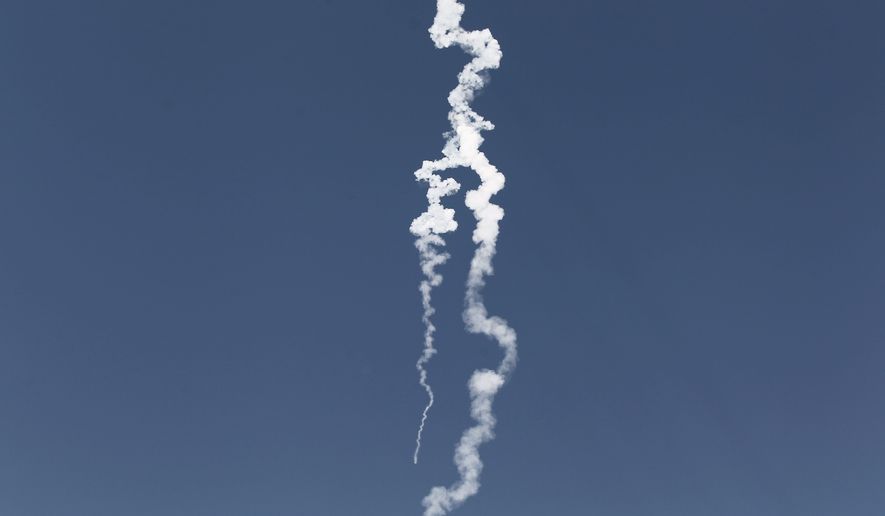JERUSALEM — Israeli defense officials on Wednesday announced the successful test-firing of a new ballistic missile and a recent air force exercise that included refueling for long-range flights, amid growing talk about an Israeli attack on Iran’s nuclear facilities.
Officials said Wednesday’s missile test and last week’s air force exercise in Sardinia were planned long ago and had nothing to do with recent media speculation about an attack on the Islamic republic’s atomic sites.
But the announcements — and foreign reports that the new missile can carry an atomic warhead and hit Iran — highlight the Israeli government’s debate over the Islamic republic, which has emerged into public view in recent days.
The Ha’aretz newspaper reported Tuesday that Prime Minister Benjamin Netanyahu has yet to muster the majority of his inner Cabinet to support a pre-emptive attack on Iran.
The newspaper said he and Defense Minister Ehud Barak had persuaded Foreign Minister Avigdor Lieberman, who initially opposed such an attack, to support it.
Four Cabinet ministers oppose an attack. They include Strategic Affairs Minister Moshe Ya’alon, a former chief of staff and a political hard-liner whose objections carry particular weight, the newspaper reported.
Mr. Ya’alon reportedly maintains that the U.S. should take the lead in any military move against Iran and that a unilateral Israeli attack should be a last resort.
Last week, Interior Minister Eli Yishai told activists in his religious Shas Party that Israel is weighing a “possible action” that is keeping him awake at night. Retaliation for that action, Mr. Yishai said, could result in tens of thousands of rockets and missiles fired by Iran’s allies — Hezbollah, Hamas and possibly Syria — as well as Iran itself.
Mr. Netanyahu last week called on the patron of the Shas Party, Rabbi Ovadia Yosef, reportedly to persuade him to support an attack.
Addressing the Knesset this week, Mr. Netanyahu said a nuclear Iran would be a grave threat to the region, the world “and, of course, a grave threat to us.”
Mr. Barak, the defense minister, said: “We’re not hiding our thoughts. We have to act in every way possible, and no options should be taken off the table.”
Public speculation about a strike on Iran is unusual for Israel, which has cloaked its past military moves in a veil of secrecy. No public talk preceded Israel’s 1981 airstrike on Iraq’s nuclear reactor or its 2007 strike on a suspected atomic facility in Syria.
By contrast, nearly every Israeli newspaper in recent weeks has carried reports by its military correspondents suggesting that Mr. Netanyahu and Mr. Barak are pushing for an attack on Iran.
This has given rise to speculation that Israel’s leaders are trying to persuade the international community to impose more sanctions on Iran to forestall a unilateral Israeli attack.
Meanwhile, the British daily newspaper the Guardian reported Wednesday that Britain’s armed forces are preparing contingency plans to support a U.S. attack on Iran’s nuclear facilities.
“British officials say that if Washington presses ahead it will seek, and receive, UK military help for any mission,” the paper said.
In addition, Israeli television’s Channel 2 reported late Wednesday that Gen. David Richards, chief of Britain’s defense staff, conferred with Israeli officials last week during a three-day visit that had not been revealed publicly, contrary to normal procedure.
Israel’s defense minister, Mr. Barak, flew to London this week.
According to foreign reports, the Jericho missile tested Wednesday is capable of carrying a nuclear warhead and reaching Iran. It is not the first time Israel has test-fired missiles capable of reaching Iran.
Military analysts say there is little time left if Israel intends to carry out a sustained raid before winter, when cloud cover becomes a serious impediment.
An attack probably would involve hundreds of aircraft. In the past, the air force has carried out long-range exercises over the Mediterranean to simulate an attack on targets 1,000 miles or more from base.
The planes presumably would strike first at Iran’s aerial defense capabilities, including the Iranian air force. Israel has acquired from the U.S. powerful bunker-busting bombs that would be needed to strike at targets hidden in mountain caves or deep underground.
Several current and former Israeli officials strongly oppose the idea of a unilateral strike. Former Mossad chief Meir Dagan has called the idea “stupid” and warned that it would set off a regional war.
Former Labor Defense Minister Binyamin Ben-Eliezer said this week said that such an attack would ignite “a horror scenario.”
In Iran, the chairman of the joint chiefs of staff, Gen. Hassan Firouzabadi, said Iran would retaliate strongly against Israel and U.S. interests if attacked. “We take the threats seriously, no matter how remote or unlikely,” he said.
Israel considers Iran its most dangerous threat.
The Islamic republic’s leader — Mahmoud Ahmadinejad — has called for Israel to be wiped off the map. Iran also supports Israel’s enemies — the Islamist militant groups Hezbollah in Lebanon and Hamas in the Gaza Strip, as well as Syria.
Iran’s nuclear program, which Tehran has said is not geared toward making an atomic weapon, has been a great concern for Israel as well as Western powers, which have imposed several sanctions against the regime.
The International Atomic Energy Agency is due to focus on the Iranian program at a meeting this month, the Associated Press reported. The West is pushing for a resolution that could set a deadline for Iran to start cooperating with an agency probe of suspicions that Tehran is secretly experimenting with components of a weapons program.




Please read our comment policy before commenting.